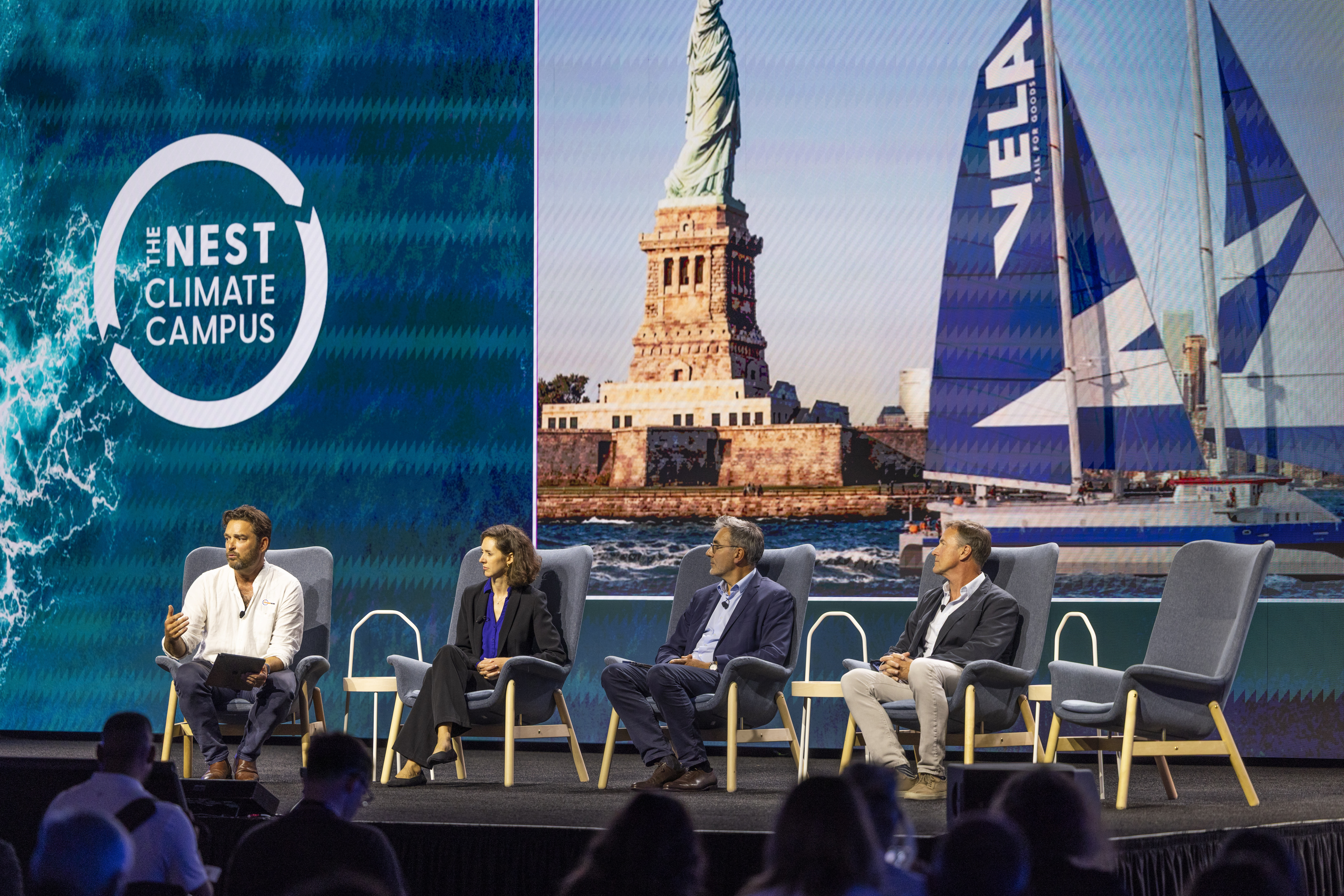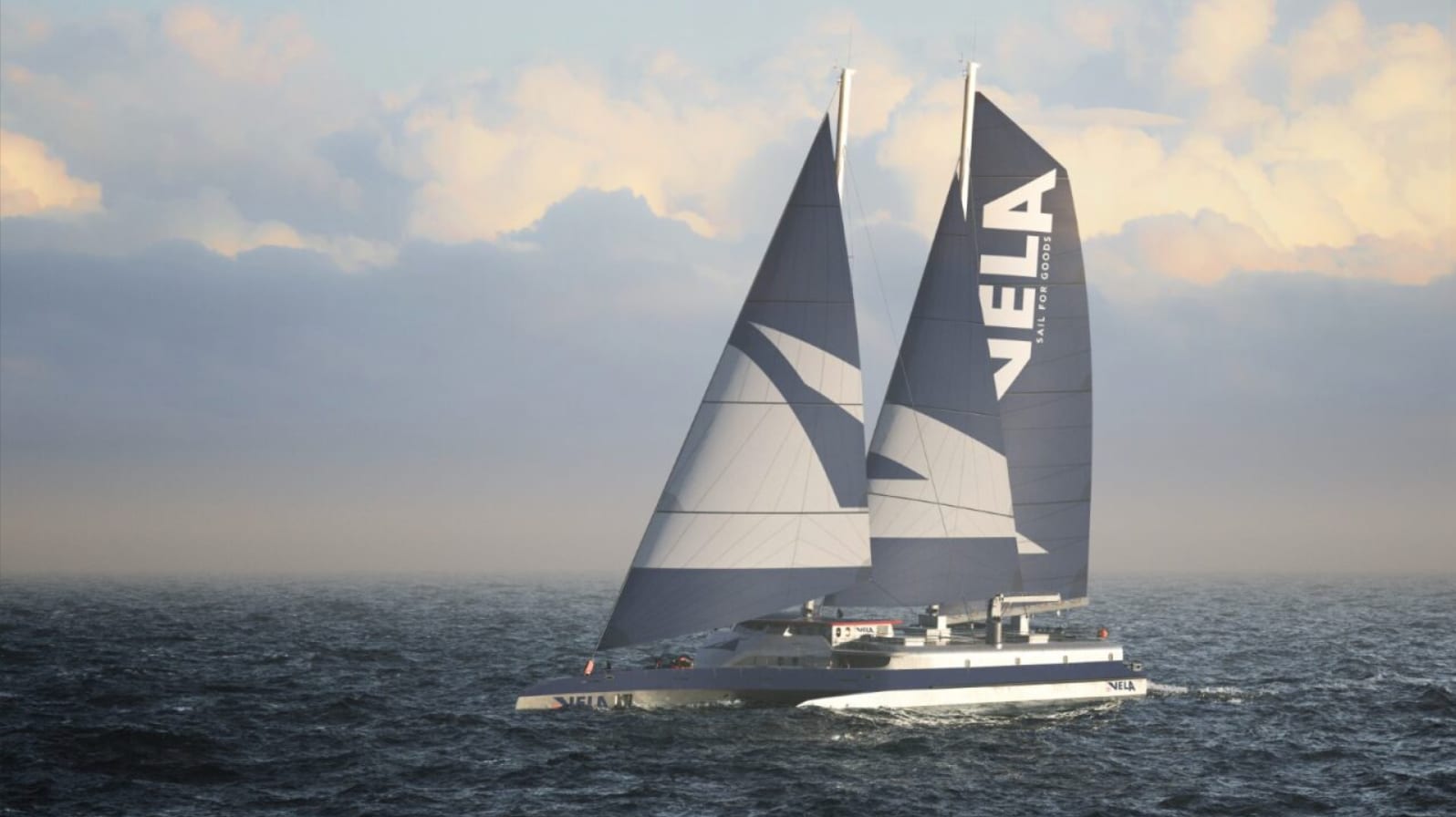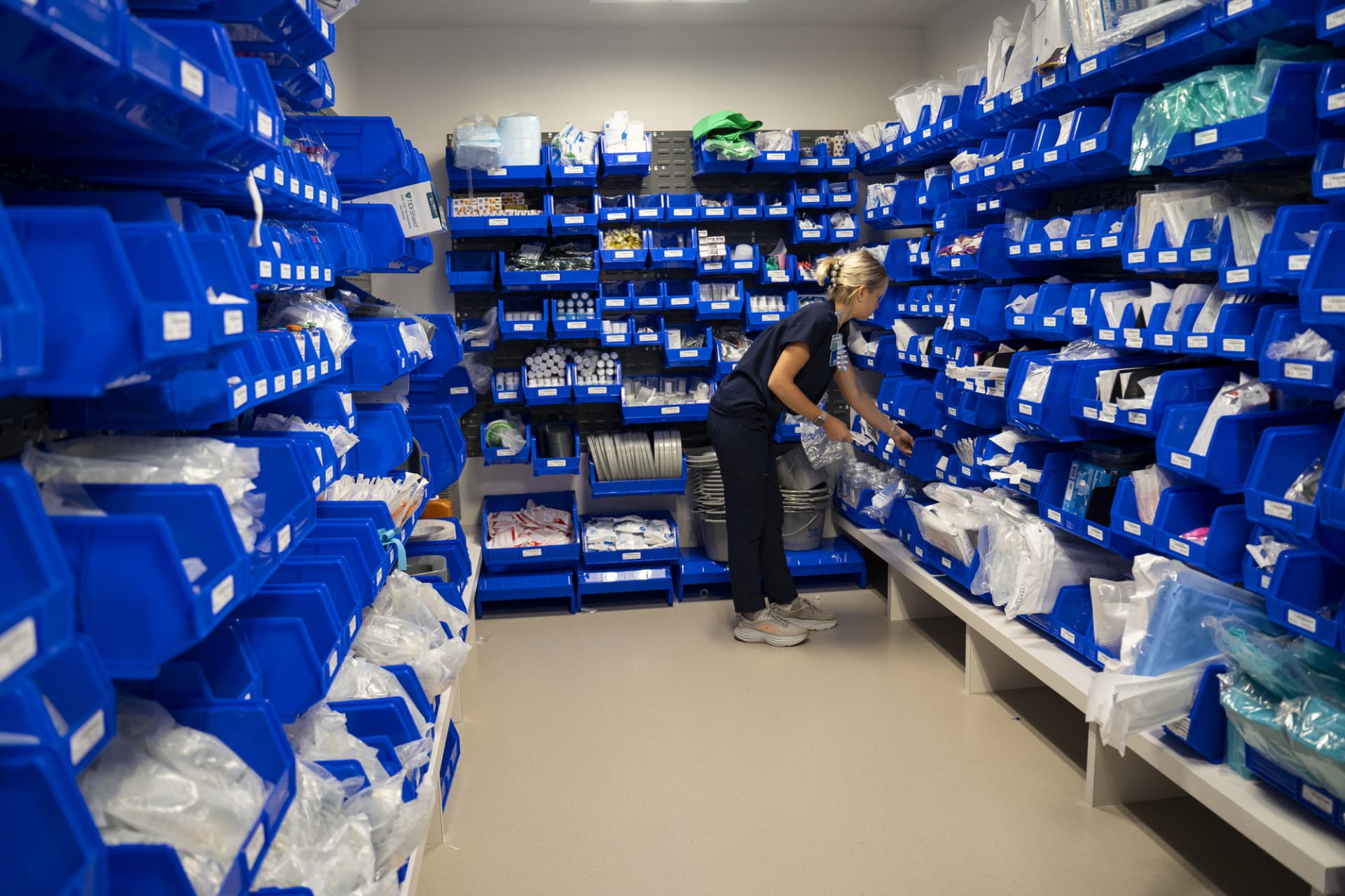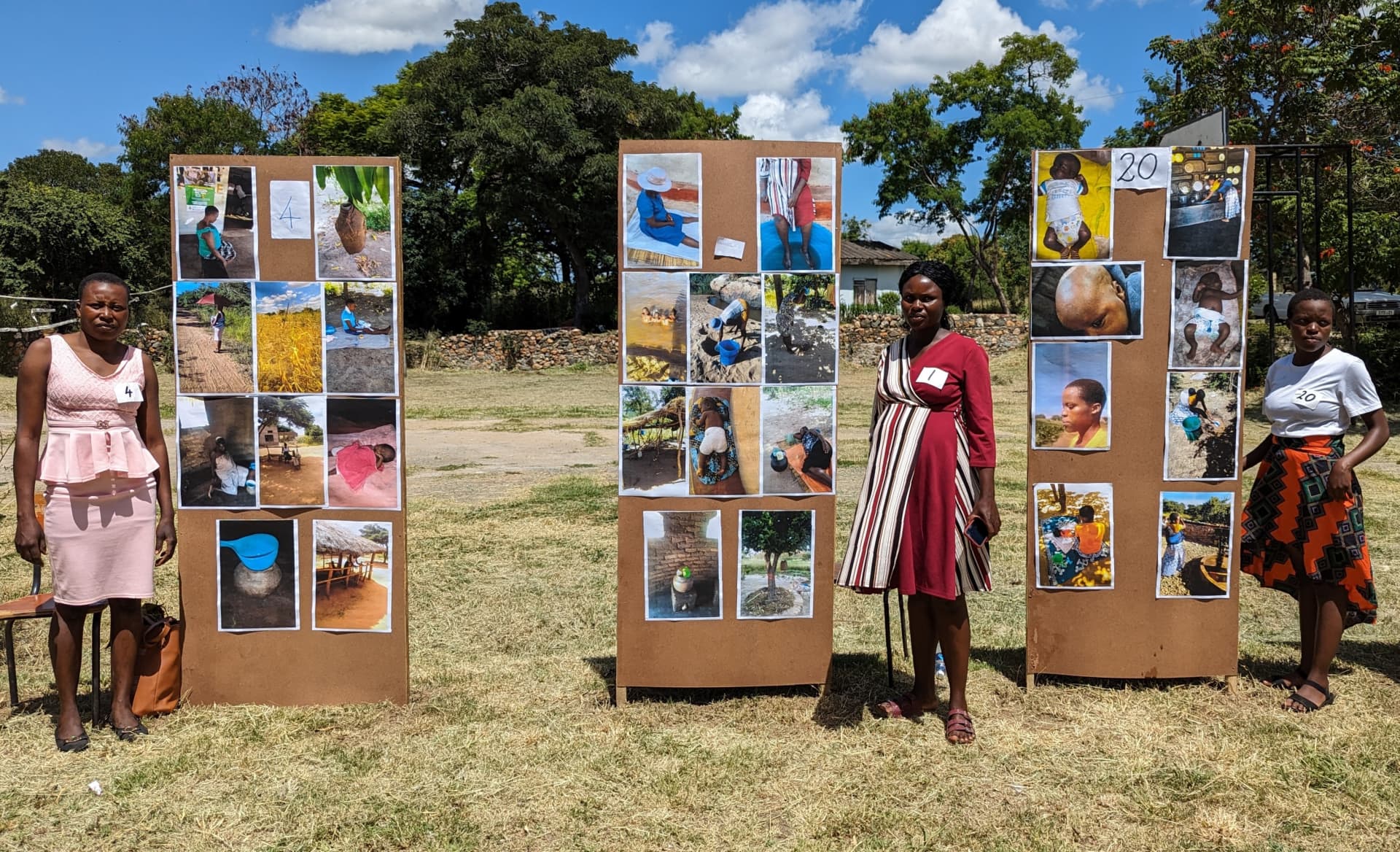Setting a sustainable course for the pharma industry | Takeda Stories

Setting sail – Pioneering sustainable transport of medicines by sea
As the first biopharmaceutical company to partner with VELA Transport to ship medicines on its wind-powered trimaran, Takeda leads in climate-smart innovation.
When you think about transporting cargo across the Atlantic Ocean, an image of a large cargo ship or an aircraft may come to mind. Now imagine something completely different: a trimaran sailboat, powered 100 percent by wind when at sea.
That’s the promise behind Takeda’s pioneering partnership with VELA Transport. Starting at the end of 2026, the company will ship certain products on VELA’s sailing cargo trimaran, cutting use-related greenhouse gas emissions by up to 99 percent compared to air freight and up to 90 percent compared to container ships.1
“We are committed to exploring new distribution options and optimizing existing ones in our ongoing dedication to safe, timely and environmentally sustainable transport of medicines,” says Takeda’s global head of environment and sustainability, Johanna Jobin.
“As part of these broader efforts, the VELA trimaran stands out as a novel, innovative and promising solution,” she says. “And as the first biopharmaceutical company to partner with VELA, we are paving the way for others in our industry to distribute sensitive medicines through wind-powered sea shipping. Our work with VELA is not only providing our company with an ultra-low-emission distribution option, but it is also setting a course to support the decarbonization of our sector’s supply chain.”
The Takeda and VELA teams are working closely to outfit the trimaran with the technology needed to transport highly regulated pharmaceutical products compliantly, maintaining quality and safety. The ship will be equipped with a temperature-controlled refrigeration system (in alignment with industry standards, such as Good Distribution Practice) and powered by renewable energy generated on board.
“Our work with VELA is not only providing our company with an ultra-low-emission distribution option, but it is also setting a course to support the decarbonization of our sector’s supply chain.”
Navigating uncharted waters
By leading the pharmaceutical industry through these uncharted waters, Takeda’s ambition is to enable other companies to join in transporting medicines using wind-powered vessels.
VELA’s Chief Executive Officer Pierre-Arnaud Vallon concurs: “Delivering life-transforming treatments across the Atlantic using only the power of the wind is a powerful example of what sustainable business practice can achieve. Together, we are building a new standard for maritime transport: efficient, sustainable, safe and resilient.”

Connecting environmental sustainability and operational excellence
The VELA trimaran provides a trans-Atlantic option that is more environmentally sustainable than traditional air or containerized sea distribution. This climate-conscious solution is marked by speed, reliability, flexibility and efficiency, all at costs comparable to Takeda’s current transportation methods.
Takeda’s head of global distribution and logistics, Xavier Baville, explains: “Our partnership with VELA is a perfect example of a win-win-win for the planet and patients, as well as our business. It exemplifies the Sanpo-yoshi mantra of our founder, Chobei Takeda, to do what is ‘good for the seller, good for the buyer and good for society.’ This principle has been part of our DNA for the last 240 years, and we expect that to continue for at least the next 240 years.”
Benefits of distributing medicines via the VELA trimaran
- The VELA trimaran is powered entirely by wind when at sea2, reducing greenhouse gas emissions by up to 99 percent compared to air freight and up to 90 percent compared to container ships.1
- VELA expects to complete transatlantic crossings in under 15 days — faster than containerized sea cargo freight — through offshore racing technologies, direct routes and the flexibility to use smaller ports with reduced congestion and wait times.
- Large containers used in traditional sea freight are less flexible when it comes to small volumes, often resulting in partially empty containers. The trimaran offers more flexibility with shipments of up to five pallets.
- The VELA trimaran offers state-of-the-art technology for tracing of products.
- The VELA trimaran has five times the cargo capacity of a cargo airplane with lower emissions and costs.
- The VELA trimaran is expected to be the only cargo sailing vessel in the world that does not use water ballasts, which can transfer invasive species across habitats. The design eliminates the discharge of foreign water, reducing impacts on biodiversity across oceans.
Connecting planet health and human health
The health of people and the health of the planet are inextricably interconnected. Since 2000, more than four million preventable deaths have been attributed to climate change.3 Yet despite the negative implications for human health, the health care sector is responsible for up to 5 percent of greenhouse gas emissions globally.4
Xavier sounds a call to action: “The pharma industry has a responsibility to reduce our emissions because the planet’s health is really about human health – the core of our industry’s mission.”

Recognizing this responsibility, Takeda has embedded sustainability throughout all business operations. The company’s partnership with VELA is one of several pioneering, solutions-focused partnerships and collaborations focused on reducing emissions, fresh water withdrawal and waste across the value chain. For example:
- Wastewater recycling: Takeda’s manufacturing facility in Lessines, Belgium, became the first pharmaceutical production site in the country to reuse 90 percent of its wastewater, thanks to an innovative wastewater recycling system. This partnership is responsible for reducing the facility’s water consumption by 60 percent, the equivalent of 315,000+ gallons or 1.2 million liters of water per day. Takeda’s goal is to recycle 90 percent of wastewater across the company globally by 2027.
- Plastics recycling: Takeda’s dengue vaccine site in Singen, Germany, partnered with Schott Pharma and Corplex to recycle plastic trays used to transport vials during production, creating a closed loop that reduced emissions by up to 50 percent per tray, while 70 percent of the plastic used to produce new trays comes from recycled plastic from the old trays.
- CO₂-free steam generation for pharmaceutical manufacturing: In partnership with the AIT Austrian Institute of Technology, Takeda’s manufacturing site in Vienna launched the innovative AHEAD (Advanced Heat Pump Demonstrator) Project, enabling allow the generation of process steam completely without fossil fuel for the first time. (Read more)
- Emissions reduction across health care value chain: Takeda and Boston Medical Center launched a first-of-its-kind research collaboration focused on identifying innovative, scalable solutions to reduce carbon emissions caused by disposal of regulated medical waste, such as pharmaceutical packaging and single-use plastics, which are among the most difficult environmental challenges facing the industry. (Read more)
Johanna explains why supplier partnerships are so important. “Takeda has some of the most ambitious climate targets in our industry. We want to achieve net-zero emissions across our operations by 2035 and across our value chain by 2040. We can't do it alone. We have to engage our suppliers and other unique partnerships up and down our value chain to reduce our emissions in a meaningful way. By doing so, we can set an example for the industry,” she says.
References
- The current scope is defined by ADEME and the Smart Freight Centre. VELA measured its impact through an independent Life Cycle Assessment conducted by a third-party. The methodology used accounts for all emissions to provide a clear and comprehensive picture of climate impact. The study concluded for the whole LCA that VELA offers the lowest climate impact of any transport solution available on a comparable route (U.S.-Europe).
- While under sail at sea, VELA operates propulsion with zero emissions. In port, the vessel complies with all local maritime regulations, requiring engine power using primarily electricity (from battery, solar and hydrogeneration) and marine diesel as a backup.
- Carlson, C.J. After millions of preventable deaths, climate change must be treated like a health emergency. Nature Medicine 30, 622 (2024). https://doi.org/10.1038/s41591-023-02765-y.
- Lenzen, Manfred et al. The environmental footprint of health care: a global assessment. The Lancet Planetary Health, Volume 4, Issue 7, e271 - e279 (2020). https://www.thelancet.com/journals/lanplh/article/PIIS2542-5196%2820%2930121-2/fulltext.
Share this story



